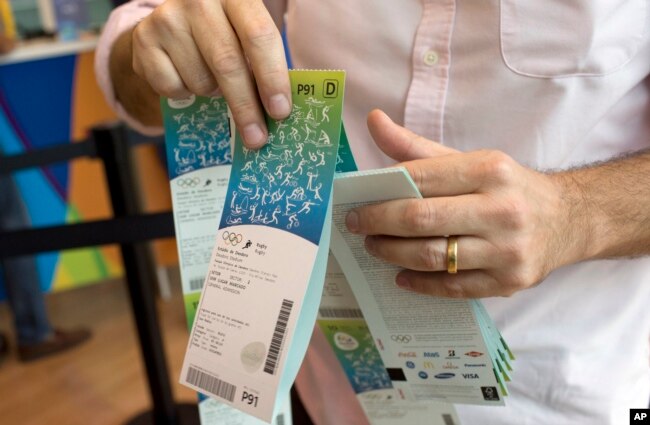The postponement of the Tokyo Olympics has created a big problem for buyers of millions of tickets to the 2020 summer games.
The games were delayed because of travel restrictions and coronavirus public safety measures. But many questions remain for people who planned to go.
Tokyo organizers and the International Olympic Committee (IOC) say the games will open on July 23, 2021. The competition schedule remains largely unchanged. More information is not expected until later this year and early next year as officials react to the developments in the COVID-19 health crisis.
Olympic tickets
Olympics events are often listed as “sold out.” But only half of the seats are filled because some people, who are given tickets or special passes, do not show up.
Four years ago, in Rio de Janeiro, IOC member Patrick Hickey of Ireland was arrested for scalping tickets. Scalping takes place when a person buys tickets to an event and tries to resell them at higher prices. Hickey claims he is innocent.
Japan has passed an anti-scalping law because of the Tokyo Olympics, although the law has several loopholes.

FILE - In this June 20, 2016, file photo, a man handles the Olympic tickets he just purchased at a shopping mall in Rio de Janeiro, Brazil. Tokyo Olympic organizers launched their ticket website on Thursday, April 18, 2019.
Olympic tickets for residents of Japan were sold through the local organizing committee. The committee says refunds for the postponement “will be carried out” no earlier than this autumn.
However, refunds are more complex for foreign buyers. That is because people outside of Japan buy tickets through Authorized Ticket Resellers appointed by national Olympic committees. These groups can add a 20 percent fee on tickets. They can combine desirable tickets with package deals at high-end hotels. They also set the foreign currency exchange rates.
In Brazil four years ago, CoSport, the ticket reseller for the United States, used a currency exchange rate that raised ticket prices.
Authorized ticket resellers have different conditions for returning money for unused tickets. Christopher Chase is a lawyer based in New York. He looked at the “Terms and Conditions” set out by Tokyo organizers about ticket use. He said those terms appeared to cover the coronavirus pandemic. But he noted that local organizers had already promised to refund buyers for the postponement, as have many official resellers.
The Associated Press talked to many ticket buyers about their plans through email.
Andrew Pham is a financial trader in Spokane, Washington. He has spent $2,500 on tickets and still plans to go to Tokyo next year.
“I would say at this point, no one should be buying or holding any tickets that they couldn’t afford to lose,” he said.
Pham said he thinks that CoSport will be unlikely to return money if the Olympics are canceled.
Sharon delPilar works as a stage manager in Las Vegas. She has spent $800 on tickets and looks forward to going to the Olympics.
“I’m willing to run the risk…I trust all efforts will be made to work things out,” she said.
Thomas Armbrustmacher of Michigan said he has spent almost $1,000 on tickets and is also taking a chance. “I am willing to take the risk that I will not get a ticket refund,” he wrote.
Brandon Nagata works for the state of Hawaii in Honolulu. He said he spent about $3,400 on tickets and had returned some of them for a refund, although he had to pay a service fee. He still plans to attend.
Tokyo organizers say at least 70 percent of the 7.8 million tickets were saved for buyers in Japan. About 4.5 million tickets have been sold to Japanese residents. Ticket sales are expected to be worth at least $800 million to local organizers.
Words in This Story
ticket – n. a piece of pare that gives the holder a right to enter a place or take part in an event
schedule – n. a plan for when things will be done and what times they will take place
loophole – n. something in a law that makes it possible for some people to legally avoid its requirements
resident – n. a person who lives somewhere permanently or for a long time
refund –n. an amount of money that is given back to someone who has returned a product, paid too much, etc.
authorized – adj. officially permitted to sell a product or service
fee – n. a payment made to a person, business or group in exchange for advice or services
package – n. a group of related things sold together for a single price
currency – n. the money that a country uses: a specific kind of money
pandemic – n. an occurrence in which a disease spreads very quickly and affects a large number of people over a wide area or throughout the world
afford – v. to be able to pay for (something)
stage manager – n. a person who supervises the physical aspects of a stage production, assists the director during rehearsals, and is in charge of the stage during a performance